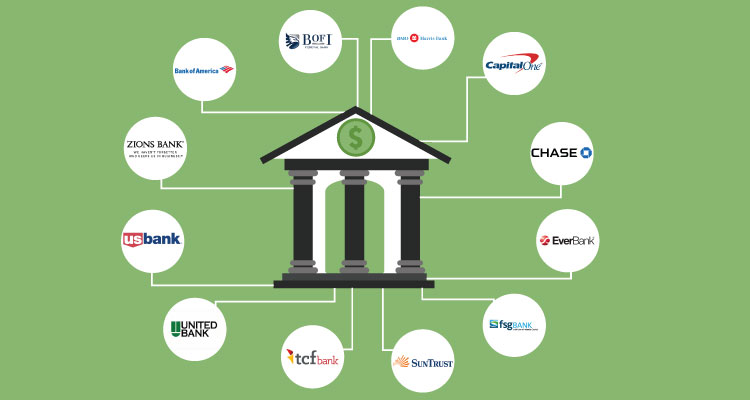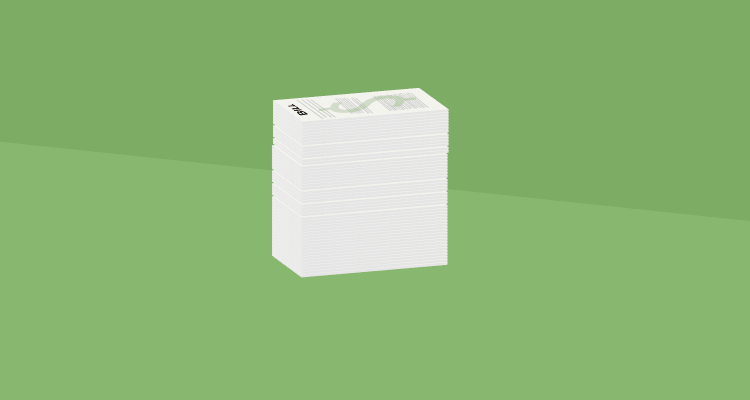Banks, like any other business, need to make a profit. While you can’t fault banks for wanting to improve their bottom line, sometimes it comes at your personal expense through unnecessary or hidden fees. But, if you’re aware of how most banks make money, you can end up saving a ton of money in the long-run.
Table of Contents
ToggleDeposits
“The largest source by far of funds for banks is deposited; money that account holders entrust to the bank for safekeeping and use in future transactions, as well as modest amounts of interest,” says Stephen D. Simpson, CFA. “Generally referred to as ‘core deposits,’ these are typically the checking and savings accounts that so many people currently have.” There are also deposits into CD deposits and money markets as well.”
Banks then use the money that you deposit to issue loans to other customers. However, Simpson adds, “While people will typically maintain accounts for years at a time with a particular bank, the customer reserves the right to withdraw the full amount at any time.” Just keep in mind that when it comes to CDs, you may get hit with a penalty if you withdraw your money before it matures.
Interest
Banks also make money on the interest that they charge for a loan — whether it’s a small business loan, mortgage, or line of credit. If you don’t have the best credit score you’ll be charged a higher interest rate. For example, the average interest rate for those with great credit is around 10 percent for unsecured loans, while those with poor credit can be between 18 percent and 36 percent.
Before applying for a loan, it would be in your best interest to improve your credit score, find a co-signer, consider getting a secured loan, and always shop around for the best interest rates. To make this process easier on your yourself, use tools like this Personal Loan Payment Calculator from NerdWallet so that you view your estimated interest rate and payments.
Fees
One of the most annoying, and infuriating, ways that banks make money is through fees — mainly with the ATM and overdraft fee. In fact, JPMorgan Chase, Wells Fargo, and Bank of America made $6 billion in ATM and overdraft fees in 2015 alone.
Banks are also known for the following annoying and sneaky fees like:
Account closing fee.
- Typically, this occurs if you close your account before a certain period of time, so if you do decide to close your account, at least wait until after that minimum period.
Paper statement fees.
- Banks charge you if you decide to receive paper statements in the mail. The easiest way to avoid this is by going paperless. This is not only more convenient since you have real-time info, it’s better for the environment too.
Monthly or annual statement fees.
- Banks, such as Bank of America, charge $12 a month as a maintenance fee. That fee is waived if you maintain a specified balance in your account. Other banks will charge you a monthly or annual maintenance fee.
Teller fees.
- If you primarily e-banking, you may be charged around $8 a month to make deposits or withdraws from a teller.
Returned deposit fee.
- If make a deposit and that check bounces, you could get hit with this fee. The good news is that many smaller banks waive this fee.
Foreign transaction fee.
- If you travel abroad and make a purchase with a card, you may get charged an additional percentage. Some banks, such as Capital One’s Venture program, don’t have these transaction fees.
Lost card fee.
- If your card is lost or stolen, you may be charged for a replacement. PNC, for instance, charges $7.50 to replace a card.
Redeeming rewards points fee.
- We all love earning rewards from our bank, but sometimes they charge us for redeeming those points. Wells Fargo charges a $24 processing fee for each airline ticket that’s issued through its rewards vendor.
- This fee isn’t common, but always read the fine print when comparing rewards programs.
Returned mail fee.
- Some banks will charge you for undelivered mail. However, if you go paperless, this fee shouldn’t be a concern.
Inactivity fees.
- If your account has been dormant, the bank may charge you a fee. If you set-up a recurring transfer or bill payment, this would get around this fee.
Interchange fees.
- If you’re a merchant that processes credit cards you’ll have to pay an interchange fee.
- The price varies depending on the type of merchant account that you have. Using companies that charge a flat fee for global transactions or using new payment options like bitcoin can lower these costs.
Investments
Banks, like any other business, make investments. Even though the Glass-Steagall Act was repealed, there are regulations on how much banks can invest. So, don’t worry about your bank losing your life’s saving on poor investment ideas.
How You Can Eliminate Fees and Charges
I’ve given you a couple pointers above on how you can avoid paying unnecessary banks fees and charges, but here’s a rundown on the best ways to eliminate these costs forever.
Shop around.
It’s not uncommon for banks to offer free-checking accounts, along with no monthly, overdraft, or minimum balance fees. At the very least your bank should allow you to do things like opt-out of overdraft protection. In this case, the transaction is denied if you don’t have enough money in your account.
Go digital.
Unlike the old days of receiving statements in the mail and manually tracking your activity, most banks have apps or mobile wallets that provide transaction alerts, daily balance updates, and the ability to transfer funds to another party for nothing. Better yet, you may even be able to avoid ATM fees since you can pay people using your mobile wallet.
Use your bank’s ATM network.
Speaking of ATM fees, you can avoid them by only using the ATMs that are in your bank’s network. This shouldn’t be a problem with banks like Chime who have a large network of 24,000 ATMs.
Use direct deposit.
Banks, such as HSBC, will waive its monthly maintenance fee if you make a direct deposit at least once per payment cycle.
Negotiate.
Banks want to keep their best customers, and if you fit the bill, then don’t hesitate to negotiate when you want a fee waived.
Link your accounts.
If you have all of you accounts linked together, like you checkings, savings, CDs, and investments, it makes it easier to automate everything from paying your bills to putting money into your emergency savings fund. It also prevents banks from charging you minimum balance or inactivity fees.








